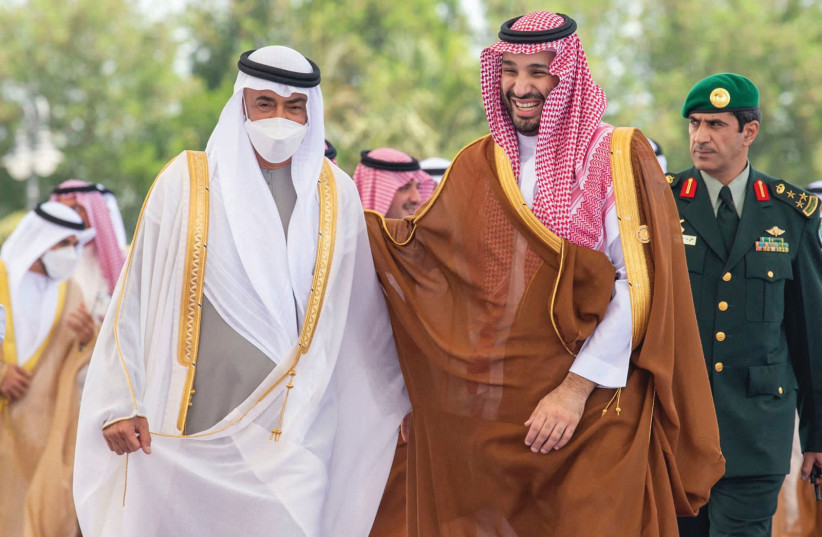Iran’s pro-regime Tasnim News on Tuesday discussed the possibility of a ceasefire between Israel and Hamas. The Commander-in-Chief of the IRGC Hossein Salami said that “the Zionists are waiting for a ceasefire, because they are in a crisis, but the Americans do not allow it.
“The anxiety among the Zionists is more deadly than what you see in Gaza, and the people of Gaza are at peace and are not afraid of anything.” He said that the US role in the Middle East today is in free fall and pointed to US support for Israel as a wedge issue. Iran clearly wants to exploit this sentiment amid talk of a ceasefire and hostages being released.
Both Iranian and Gulf media focused on yesterday’s BRICS summit in reference to a ceasefire. Neither provided many details of the discussions. Instead, Al-Ain media in the Gulf focused on Saudi Arabia’s calls for a Palestinian state. Arab News reported that “Saudi Arabia demands the start of a serious and comprehensive peace process to establish a Palestinian state along the borders of 1967,” the kingdom’s crown prince said on Tuesday.”
Furthermore, “the crown prince added that the kingdom rejects the enforced displacement of Palestinians and called on all countries to stop exporting arms to Israel.” In the final statement of the emergency virtual summit of BRICS hosted in Johannesburg, the BRICS group called for “an immediate and permanent humanitarian truce leading to a cessation of hostilities” in Gaza.
Reuters noted that “Russian President Vladimir Putin called on Tuesday for a political solution to the Israeli-Palestinian conflict and said regional states and members of the BRICS group of countries could be involved in efforts to reach such a settlement.”

The BRICS group includes Brazil, Russia, India, China, and South Africa. It agreed in August to expand by adding Saudi Arabia, Iran, Ethiopia, Egypt, Argentina, and the United Arab Emirates as members.
The National in the UAE noted that UAE “President Sheikh Mohamed on Tuesday renewed calls for an immediate ceasefire in the Israel-Gaza war.” He was also speaking at the BRICS meeting. “At a virtual BRICS summit discussing the situation in the Gaza Strip, the UAE reiterated its call for the protection of civilian lives, unrestricted humanitarian access, and an immediate ceasefire,” Sheikh Mohamed wrote on X. “The international community has a great responsibility to pursue all efforts aimed at ending the conflict and achieving a fair and lasting peace,” he added.
Iranian president condemns US for supporting Israel in Gaza
Iran’s President Ebrahim Raisi also bashed Israel on Tuesday. He made no reference to the hostages, but demanded that countries seek to end Israel’s operations in Gaza. He also bashed the US for backing Israel. “America and the western countries that oppose the ceasefire in Gaza no longer have credibility with the people of the world,” he said.
“Today, the BRICS member states have a historical responsibility to prove that human values cannot be sacrificed for political interests. Based on this, I would like to emphasize these suggestions to stop the crime and help the people of Gaza.”
The Houthi-linked TV channel Al-Masirah ignored the ceasefire discussions. Instead, it mentioned Hezbollah’s support for the recent Houthi hijacking of a freighter in the Red Sea. The Al-Mayadeen TV news channel, which is pro-Iran, also did not mention the ceasefire talks. It focused instead on claims that Israel had carried out an airstrike in Lebanon, harming its journalists.
Jordan’s Al-Ghad newspaper noted that the kingdom supports a field hospital in Gaza. It said Jordan had been unable to carry out a third airdrop for the field hospital. The same paper media quoted Israeli media and claims Hamas has dictated the terms of a ceasefire deal.
Kuwait’s Al-Jarida newspaper focused on Egypt and Saudi Arabia’s comments at the BRICS meeting. It noted that Saudi Arabia had called for an end of arms exports to Israel. It quoted Egypt’s leadership as saying they rejected any displacement of Palestinians from Gaza.
Iran’s pro-regime Fars News agency also said that Israel is a threat to regional peace.
Overall, the context of these articles illustrates that most regional media are not focused on the release of hostages by Hamas. In fact, most of the regional media do not focus on Hamas at all or the crimes of Hamas. Instead, they primarily focus on the need for a ceasefire, or on slamming Israeli actions.
The increasing work of Arab countries with forums such as BRICS and also discussions with China, Russia, or South Africa, illustrates that they are generally not openly meeting with the US or coordinating with the West.
